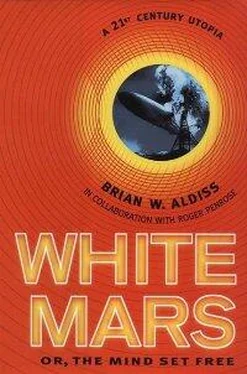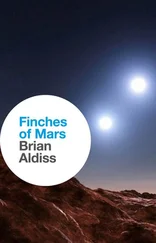Brian Aldiss - White Mars
Здесь есть возможность читать онлайн «Brian Aldiss - White Mars» весь текст электронной книги совершенно бесплатно (целиком полную версию без сокращений). В некоторых случаях можно слушать аудио, скачать через торрент в формате fb2 и присутствует краткое содержание. Год выпуска: 1999, ISBN: 1999, Издательство: Little, Brown UK, Жанр: Фантастика и фэнтези, на английском языке. Описание произведения, (предисловие) а так же отзывы посетителей доступны на портале библиотеки ЛибКат.
- Название:White Mars
- Автор:
- Издательство:Little, Brown UK
- Жанр:
- Год:1999
- ISBN:0-316-85243-0
- Рейтинг книги:5 / 5. Голосов: 1
-
Избранное:Добавить в избранное
- Отзывы:
-
Ваша оценка:
- 100
- 1
- 2
- 3
- 4
- 5
White Mars: краткое содержание, описание и аннотация
Предлагаем к чтению аннотацию, описание, краткое содержание или предисловие (зависит от того, что написал сам автор книги «White Mars»). Если вы не нашли необходимую информацию о книге — напишите в комментариях, мы постараемся отыскать её.
White Mars — читать онлайн бесплатно полную книгу (весь текст) целиком
Ниже представлен текст книги, разбитый по страницам. Система сохранения места последней прочитанной страницы, позволяет с удобством читать онлайн бесплатно книгу «White Mars», без необходимости каждый раз заново искать на чём Вы остановились. Поставьте закладку, и сможете в любой момент перейти на страницу, на которой закончили чтение.
Интервал:
Закладка:
However, she would notice that her ideas had been taken into consideration. Phylogeny was on the timetable for even small children, wherein the make-up of human consciousness and her understanding concerning archetypes could be considered.
She gazed frowningly into a corner of the room.
Tom shuffled somewhat before asking Belle Rivers not to believe that he was without sympathy for her religious instincts. He was himself all too conscious of the divine aspect of things. Did not everyone who was not utterly bowed down by misfortune or illness, he asked, have a sense of a kind of holiness to life?
Staring hard at Belle, he became lyrical and so, I thought, possibly insincere.
As we moved through our lives, he continued, was there not a vein of enchantment in events, in awakening, in sleeping, in our dreams and in the power of thought? That elusive element, which the best artists, writers, musicians, scientists—even ordinary persons in ordinary jobs—experienced, that special lovely thing of which it was difficult to speak, but which gave life its magic. It might perhaps be simply the ticking of the biological clock, the joy in being alive. Whatever it was, that firefly thing, it was something of which the poet Marlowe spoke:
One thought, one grace, one wonder, at the least
Which into words no virtue can digest.
Listening to this speech, Belle Rivers clasped her hands on the desk in front of her and appeared to study them.
Religion, at least the Christian religion, Tom said, changed over time, abandoning the ill-tempered and savage Jehovah of the Old Testament for a more responsive faith in redemption—though it still based itself on such impossibilities as virgin birth, the resurrection of the dead and eternal life—impossibilities designed to impress the ignorant of Christ’s unscientific age.
When the Omega Smudge would be detected, we should see a genuine miracle—once we understood what had been detected. (Yet would I ever understand this area of science? I made a resolve to learn still more …)
By going two steps forward and one step back, continued Tom, humankind since the days of Jesus Christ had scraped together some knowledge of the world, the universe and themselves. The situation now, in the late middle of the twenty-first century, was that God got in the way of understanding. God was dark matter, an impediment rather than an aid to our proper sense of the divine aspect of things. We had been forced to leave many good things behind on Earth; God should be left behind too.
The world was more wonderful without him.
Belle Rivers, continuing to regard her hands, said merely, “It cannot be more wonderful without him, since he created it.”
Until this juncture Mary Fangold had remained silent, watching Tom and Belle with a faint smile on her lips. Tom said afterwards that Mary, the apostle of reason, knew we had fallen into human error by excluding the hard-working Belle from most of our educational plans. She felt her position to be undermined. Mary spoke up.
The prospectus is only at the planning stage, Belle. We rely on you to continue teaching, just as the children rely on you. We wonder if you would care to include a subject such as we might call, say, Becoming Individual, in your timetable, whereby religion would form a part of it, together with archetypal behaviour and the interrelationship of conscious and sub-conscious.”
Belle regarded her suspiciously. “That does not sound like my idea of religion.”
“Then let’s say religion and reason…”
After a moment’s silence, Belle smiled and said, “Do not think I am trying to be difficult. Basically, your entire plan for improved learning cannot flourish without one additional factor.”
She waited for us to ask her what that factor might be. Then she explained that there were children who were always resistant to learning, who found reading and writing hard work. Others were happy and fulfilled with such things. The difference could be accounted for by the contrast between those children who were sung to and read to by their mothers and fathers from birth onwards, perhaps even before birth, when the child was still in utero, and those who were not, who were neglected.
Learning, she said, began from Day One. If that learning was associated with the happiness and security of a parent’s love, then the child found no impediments to learning and to the enjoyment of education. Those children whose parents were silent or indifferent had a harder slog through life.
The basis of all that was good in life was, she declared, simply love and care, which arose from a love of Christ.
Tom rose and took her hand. “We are in perfect agreement there, at least as far as love and care of the child are concerned,” he said. “You have probably cited the most vital thing. There’s no harm in using Christ as an exemplar. We’re very happy you are the headmistress here, and in charge of learning.”
Tom’s and my, in some respects, mysterious, relationship deepened. I was legally adopted as his daughter at a small ceremony; I became Cang Hai Jefferies, and lived in harmony with him. To be truthful, I mean more or less in harmony with him. It was not easy to get mentally close.
Often when my new leg troubled me—it got the twitches—I would lie in his arms. This was bliss for me; but he never attempted a sexual advance.
Our activities had become formalised. Indoor sports, plays, revues, recitations, dances and baby exhibitions (the many pregnancies had yielded our first Mars-born infants) were weekly events. Training for the first Mars marathon was in progress.
A woman of French origin, Paula Gallin, produced a dark, austere play, shot through with humour, which combined video with human actors. My Culture, to give it its title, was reluctantly received at first, but slowly became recognised as a master work. Most of the action took place on a flat sloping plain, the tilt of which increased slowly as the play proceeded.
My Culture played a part in turning our community into the world’s first modern psychologically oriented civilisation. The setting-up of the Smudge Project grew nearer to completion by the end of 2065, despite material limitations hampering its development. Dreiser kept us informed by frequent bulletins on the Ambient. But many of us sensed that the technological culture of Earth was gradually giving way to an absorption in Being and Becoming.
Being and Becoming had a very practical focus in the maturing of our children. It was prompted by a natural anxiety regarding the happy development of the young in a confined, largely “indoor” world. But the comparative gloom of Mars prompted introspection and, indeed, empathy. It was noted early in our exile that most of us enjoyed unusually vivid dreams of curious content. These dreams, it was understood, put us in touch with our phylogenetic past, as if seeking or possibly offering therapeutic reassurance.
Mistaken Historicism had filled the world with the idea of progress, bringing greater pressure on greater numbers of people, the rise of megacities and the loss of pleasant communication with the self. A wise man of the twentieth century, Stephen Jay Gould, said: “Progress is a noxious, culturally embedded, nonoperational, intractable idea that must be replaced.”
We were trying to replace it—not by going back but going forward into a realisation of our true selves, our various selves, which had experience of the evolutionary chain. Exchanging technocracy for metaphysics, in Belle’s words.
My true self led me to experience pregnancy. Shortly after our much delayed adoption ceremony, I went to the hospital, where I had myself injected with some of Tom Jefferies’s DNA. My womb was grateful for the benevolent gravity and I delivered my beautiful daughter Alpha without pain one day in March 2067. Tom was with me at the birth. There my baby lay in my arms, red in the face after her exertions to emerge into the world, with the most exquisite little fingers you ever saw. Alpha had dark hair and eyes as blue as Earth’s summer skies. And a temperament as fair.
Читать дальшеИнтервал:
Закладка:
Похожие книги на «White Mars»
Представляем Вашему вниманию похожие книги на «White Mars» списком для выбора. Мы отобрали схожую по названию и смыслу литературу в надежде предоставить читателям больше вариантов отыскать новые, интересные, ещё непрочитанные произведения.
Обсуждение, отзывы о книге «White Mars» и просто собственные мнения читателей. Оставьте ваши комментарии, напишите, что Вы думаете о произведении, его смысле или главных героях. Укажите что конкретно понравилось, а что нет, и почему Вы так считаете.










